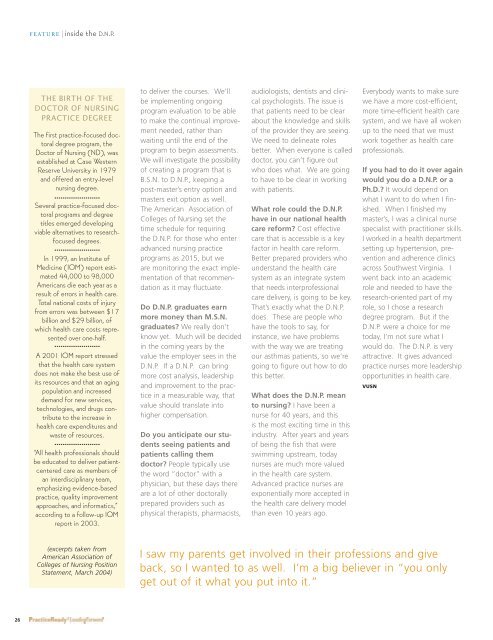Removing the Dark Clouds - Vanderbilt University School of Nursing
Removing the Dark Clouds - Vanderbilt University School of Nursing
Removing the Dark Clouds - Vanderbilt University School of Nursing
Create successful ePaper yourself
Turn your PDF publications into a flip-book with our unique Google optimized e-Paper software.
26<br />
F E AT U R E |inside <strong>the</strong> D.N.P.<br />
THE BIRTH OF THE<br />
DOCTOR OF NURSING<br />
PRACTICE DEGREE<br />
The first practice-focused doctoral<br />
degree program, <strong>the</strong><br />
Doctor <strong>of</strong> <strong>Nursing</strong> (ND), was<br />
established at Case Western<br />
Reserve <strong>University</strong> in 1979<br />
and <strong>of</strong>fered an entry-level<br />
nursing degree.<br />
Several practice-focused doctoral<br />
programs and degree<br />
titles emerged developing<br />
viable alternatives to researchfocused<br />
degrees.<br />
In 1999, an Institute <strong>of</strong><br />
Medicine (IOM) report estimated<br />
44,000 to 98,000<br />
Americans die each year as a<br />
result <strong>of</strong> errors in health care.<br />
Total national costs <strong>of</strong> injury<br />
from errors was between $17<br />
billion and $29 billion, <strong>of</strong><br />
which health care costs represented<br />
over one-half.<br />
A 2001 IOM report stressed<br />
that <strong>the</strong> health care system<br />
does not make <strong>the</strong> best use <strong>of</strong><br />
its resources and that an aging<br />
population and increased<br />
demand for new services,<br />
technologies, and drugs contribute<br />
to <strong>the</strong> increase in<br />
health care expenditures and<br />
waste <strong>of</strong> resources.<br />
“All health pr<strong>of</strong>essionals should<br />
be educated to deliver patientcentered<br />
care as members <strong>of</strong><br />
an interdisciplinary team,<br />
emphasizing evidence-based<br />
practice, quality improvement<br />
approaches, and informatics,”<br />
according to a follow-up IOM<br />
report in 2003.<br />
(excerpts taken from<br />
American Association <strong>of</strong><br />
Colleges <strong>of</strong> <strong>Nursing</strong> Position<br />
Statement, March 2004)<br />
to deliver <strong>the</strong> courses. We’ll<br />
be implementing ongoing<br />
program evaluation to be able<br />
to make <strong>the</strong> continual improvement<br />
needed, ra<strong>the</strong>r than<br />
waiting until <strong>the</strong> end <strong>of</strong> <strong>the</strong><br />
program to begin assessments.<br />
We will investigate <strong>the</strong> possibility<br />
<strong>of</strong> creating a program that is<br />
B.S.N. to D.N.P., keeping a<br />
post-master’s entry option and<br />
masters exit option as well.<br />
The American Association <strong>of</strong><br />
Colleges <strong>of</strong> <strong>Nursing</strong> set <strong>the</strong><br />
time schedule for requiring<br />
<strong>the</strong> D.N.P. for those who enter<br />
advanced nursing practice<br />
programs as 2015, but we<br />
are monitoring <strong>the</strong> exact implementation<br />
<strong>of</strong> that recommendation<br />
as it may fluctuate.<br />
Do D.N.P. graduates earn<br />
more money than M.S.N.<br />
graduates? We really don’t<br />
know yet. Much will be decided<br />
in <strong>the</strong> coming years by <strong>the</strong><br />
value <strong>the</strong> employer sees in <strong>the</strong><br />
D.N.P. If a D.N.P. can bring<br />
more cost analysis, leadership<br />
and improvement to <strong>the</strong> practice<br />
in a measurable way, that<br />
value should translate into<br />
higher compensation.<br />
Do you anticipate our students<br />
seeing patients and<br />
patients calling <strong>the</strong>m<br />
doctor? People typically use<br />
<strong>the</strong> word “doctor” with a<br />
physician, but <strong>the</strong>se days <strong>the</strong>re<br />
are a lot <strong>of</strong> o<strong>the</strong>r doctorally<br />
prepared providers such as<br />
physical <strong>the</strong>rapists, pharmacists,<br />
audiologists, dentists and clinical<br />
psychologists. The issue is<br />
that patients need to be clear<br />
about <strong>the</strong> knowledge and skills<br />
<strong>of</strong> <strong>the</strong> provider <strong>the</strong>y are seeing.<br />
We need to delineate roles<br />
better. When everyone is called<br />
doctor, you can’t figure out<br />
who does what. We are going<br />
to have to be clear in working<br />
with patients.<br />
What role could <strong>the</strong> D.N.P.<br />
have in our national health<br />
care reform? Cost effective<br />
care that is accessible is a key<br />
factor in health care reform.<br />
Better prepared providers who<br />
understand <strong>the</strong> health care<br />
system as an integrate system<br />
that needs interpr<strong>of</strong>essional<br />
care delivery, is going to be key.<br />
That’s exactly what <strong>the</strong> D.N.P.<br />
does. These are people who<br />
have <strong>the</strong> tools to say, for<br />
instance, we have problems<br />
with <strong>the</strong> way we are treating<br />
our asthmas patients, so we’re<br />
going to figure out how to do<br />
this better.<br />
What does <strong>the</strong> D.N.P. mean<br />
to nursing? I have been a<br />
nurse for 40 years, and this<br />
is <strong>the</strong> most exciting time in this<br />
industry. After years and years<br />
<strong>of</strong> being <strong>the</strong> fish that were<br />
swimming upstream, today<br />
nurses are much more valued<br />
in <strong>the</strong> health care system.<br />
Advanced practice nurses are<br />
exponentially more accepted in<br />
<strong>the</strong> health care delivery model<br />
than even 10 years ago.<br />
Everybody wants to make sure<br />
we have a more cost-efficient,<br />
more time-efficient health care<br />
system, and we have all woken<br />
up to <strong>the</strong> need that we must<br />
work toge<strong>the</strong>r as health care<br />
pr<strong>of</strong>essionals.<br />
If you had to do it over again<br />
would you do a D.N.P. or a<br />
Ph.D.? It would depend on<br />
what I want to do when I finished.<br />
When I finished my<br />
master’s, I was a clinical nurse<br />
specialist with practitioner skills.<br />
I worked in a health department<br />
setting up hypertension, prevention<br />
and adherence clinics<br />
across Southwest Virginia. I<br />
went back into an academic<br />
role and needed to have <strong>the</strong><br />
research-oriented part <strong>of</strong> my<br />
role, so I chose a research<br />
degree program. But if <strong>the</strong><br />
D.N.P. were a choice for me<br />
today, I’m not sure what I<br />
would do. The D.N.P. is very<br />
attractive. It gives advanced<br />
practice nurses more leadership<br />
opportunities in health care.<br />
I saw my parents get involved in <strong>the</strong>ir pr<strong>of</strong>essions and give<br />
back, so I wanted to as well. I’m a big believer in “you only<br />
get out <strong>of</strong> it what you put into it.”<br />
VUSN


